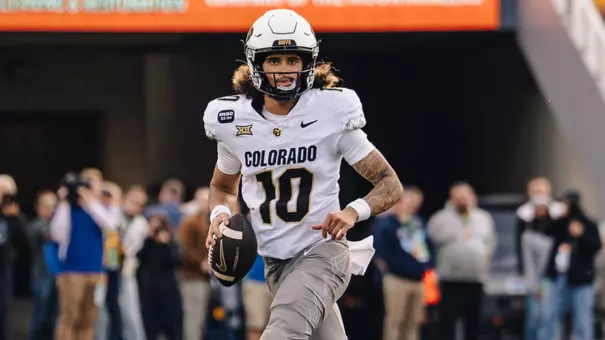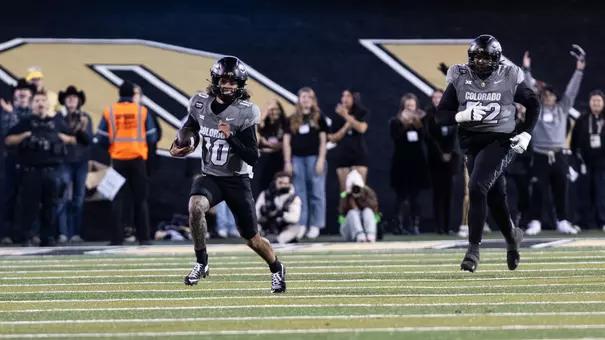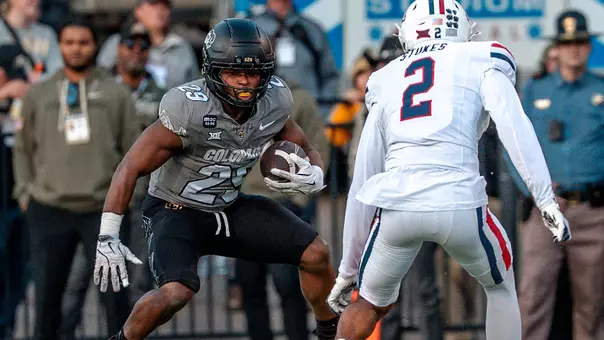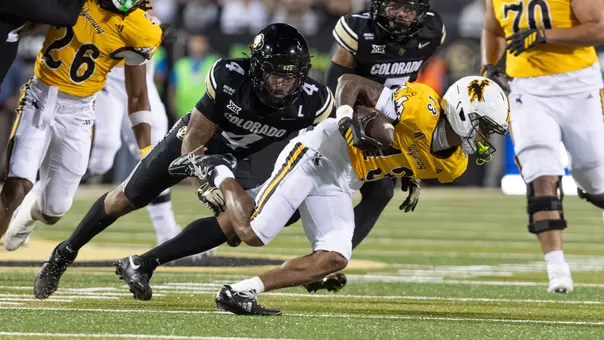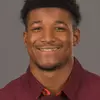Colorado University Athletics

Woelk: MacIntyre, Buffs Focusing On 'Finishing,' Physicality
April 30, 2018 | Football, Neill Woelk
BOULDER — While the reasons behind last fall's 5-7 finish by the Colorado Buffaloes were myriad, there was still one overriding theme when the dust had settled:
The Buffs were unable to finish. Unlike 2016, when Mike MacIntyre's Buffs made sealing the deal a trademark of their season, the 2017 Buffs reverted back to 2015 form, coming up just short in too many instances.
On at least four different occasions, Colorado either had a lead or was well within striking range late in the game, only to let it slip away:
In their Pac-12 opener, the Buffs led Washington early, and still trailed by just a touchdown, 17-10, midway through the third quarter (after settling for a field goal). The Huskies, however, put the last 20 points of the game on the board to collect a 37-10 win.
At UCLA, the Buffs led early, then pulled to within one point late in the third quarter and again midway through the fourth — both times with red-zone field goals. On either instance, a touchdown would have given Colorado a three-point lead and changed the entire complexion of the game. Instead, the Buffs ended up on the short end of a four-point loss, 27-23.
In a wild affair against Arizona, the Buffs pulled to within a touchdown of the Wildcats on three different occasions in the second half. A defensive stop on any of the ensuing UA possessions would have given Colorado a chance to tie the game and switch momentum to the CU sidelines. But, the Buffs couldn't come up with one of those stops and dropped a 45-42 decision.
At Arizona State, Colorado led by 10 early, a lead that easily could have been 17 or more had it not been for some dropped passes. The Buffs still led by 10 in the third quarter and by three in the fourth, but again settled for a field goal when a touchdown would have provided a seven-point edge. In the end, the Buffs couldn't come up with a stop and lost, 41-30.
Bottom line? Had the Buffs managed to get a win in even one of those four games, they would have been bowl eligible. Had they managed to win two of those four, it would have guaranteed Colorado's first back-to-back winning seasons since 2004-05.
Instead, they were once again on the outside looking in during bowl season — and it is why MacIntyre and his staff made finishing one of their top priorities of spring practice.
"One thing, especially this spring, was a goal of making sure that we were more physical and that we finished off games better," MacIntyre said during a Monday morning conference call with national media. "We focused on those type of things. A lot of end-game situations. Even though it's spring, I wanted that on their minds."
That meant more two-minute drills, more turnover drills and simply more concentration on end-of-game situations that make the difference.
"The overall thing was to make sure that we were more physical when we came out of spring and we had a lot of end-game situations, because we didn't finish some games like we'd liked last year," MacIntyre said. "(We) tried to put them in a lot of those situations over and over, more than you usually would in the spring."
Last fall's inability to finish in critical situations was not limited to either the offense or defense. It was a team effort, with both sides of the ball coming up short in key instances.
That, MacIntyre and his staff believe, can be attributed to a lack of "physicality," particularly up front. Football games are controlled at the line of scrimmage, and when push came to shove, the Buffs didn't have enough of either in decisive moments down the stretch.
That's another area on which the Buffs focused in the spring.
The current format of spring football also provides the opportunity for more physical practices. NCAA rules allow the 15 practices to be spread over as much as 34 days, with 12 in pads and eight with full-contact tackling allowed 50 percent of the time.
That means the Buffs could utilize full contact on a regular basis and still have a day off between practices for recovery.
"You can be physical a day, then you take a day off," MacIntyre said. "Then you're physical and you take the weekend off and you can be physical on a Monday. We really tried to improve our offensive line and our defensive line and the physicality area of that. Being able to take some days off in between and being able to space your spring practice out allowed us to do that. … You can't just go physical every single day when you go back to back to back in the fall. In the spring you can do that more."
That focus didn't stop with the end of spring ball. Rather, it continues in the weight room.
The Buffs this week are finishing up their last strength and conditioning session of the semester and will then have a break after school is out before returning for summer school and another strength and conditioning period, along with player-led volunteer workouts.
Pac-12 Media Day is scheduled for July 25, with the Buffs tentatively scheduled to report for fall camp on Aug. 1.
Monday, MacIntyre also addressed several other issues from the media, including:
On if CU might return to a "running back by committee" with Phillip Lindsay now trying to earn a spot on the Denver Broncos' roster. The Buffs have three running backs with game experience returning in Beau Bisharat, Kyle Evans and Donovan Lee, and will also have graduate transfer Travon McMillian (Virginia Tech) in camp this summer: "We'll see how fall camp goes. If we feel like we have enough guys that we can rely on, we'll do that. If we feel like it's just one or two guys, we'll do that. If we have a hot guy running it, I'm going to run that hot guy as much as I can. That's worked for us in the past. We've done it by committee before also. It's going to depend on how fall camp goes, to be honest with you."
On whether the Pac-12's 1-8 record in bowl games was a true indicator of the conference's strength: "The bowl situation is a little different than it used to be. You have guys not participating in bowl games. You also have injury situations when you hit those bowl games. A lot of that takes place more than it used to. It's definitely concerning that we went 1-8. We weren't in a bowl so we weren't there to help at all and we didn't win our bowl the year before. All of us in our conference want to win every bowl game we play in. Hopefully this coming up year we'll make a better showing in the bowl games."
On whether the bowl record will influence the CFP selections next year: "I don't think so because they're going to look at the body of work you do this year and who you play and how you play and how your talent's doing and how your quarterbacks are playing. I don't think they'll think one second about your bowl record the year before on picking the playoffs. If they do, they're not doing their job right."
On whether he still likes the early signing date in December and this year's first go-round of "official" spring recruiting visits: "I definitely am (a fan). I think more and more people will like that. That December 20th (early signing date) comes around fast. Official visit weekends during the season are hard. They're not as good of a visit. You don't have as much time. They fly in on Saturday mornings or get in late on Friday nights. You miss all the day Friday that you usually use. Saturdays you are preparing for a game and Sunday they have to fly back home. The Dec. 20 signing date, you are hoping to have some visits after your last game and Thanksgiving, but you are preparing for a bowl, you're out recruiting — it really hampers that. A lot of those kids are in playoff until the first of December or the second week in December. … I think the early official visit is something people will do more and more. Of course I'd like to have an early signing date in July and I think eventually that might happen."
On whether it will be more difficult to prepare for three new coaches in the Pac-12 South (Chip Kelly at UCLA, Kevin Sumlin at Arizona and Herm Edwards at Arizona State): "It depends on when you play them. ... If you are playing them four, five, six games into the season, it's not as challenging. If you're playing them early, early in the year it's more challenging. You go back and look at their old history and teams they've coached and things they did and usually some of that stuff carries over. You also look at their coordinators, who they've hired. Is it the same coordinators they've had or is it different people? You also look at what the coordinators have done, too, and you figure out how to mix all of that together. You watch a lot of tape and then you should have a pretty good idea."
Contact: Neill.Woelk@Colorado.edu


